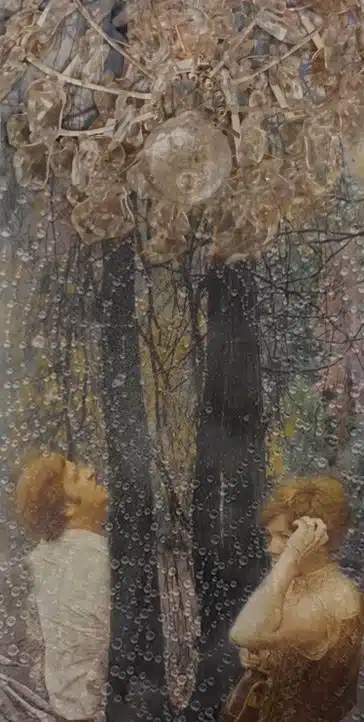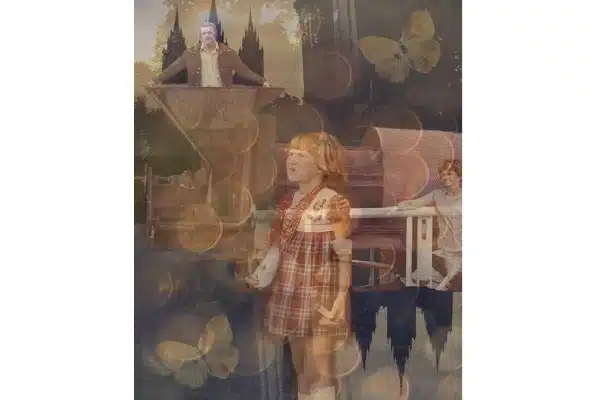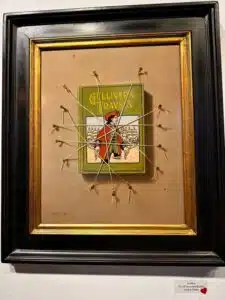Recently at a photography exhibit, I was gob smacked by Los Angeles photographer Corinne Cobabe’s portfolio Perfect is Not a Word.
Her accompanying artist’s statement was “Nice big home. Nice cars. Nice things. Big family. Very religious. High standards. Arguments. Substances. Lots of money. Then none. Eventually, a divorce. Leaving boxes filled with genuine laughter, tenderness, privilege…but also grief. Though, from the outside, perfect.”
Her photographs and her description of them were compelling, and I wondered if she would to talk to me about the emotional landscape she expressed in her art. I reached out, and we set up a time to talk.
One of the pieces we discussed was the one above. In it, Corinne juxtaposed a photograph of her father standing in a cement mixer (he was a real estate investor) with that of a Mormon temple (conveying his role as head of her religious family). Her mother, who left their marriage and, for a time, their religion as well, was pulled in from another image – though separated by a ladder and looking forward, she was simultaneously keeping an eye on Corinne, a little girl who looks confused, but also overwhelmed by the constant pressure to “be perfect”.
As Corinne and I talked about her work, and this piece in particular, Corinne relayed how as an adult she had told her mother she had felt enormous pressure to be “perfect”: how her looks, her weight, her appearance, and how she “showed” were highly prized, but how she felt, her inner world, was largely ignored. In addition, she told her mother that she wasn’t there for her in her 20’s. Her mother explained that she was just trying to survive, and was sorry but she simply couldn’t be there then as during those years — she’d been too immersed in her own problems to be present for Corinne. But now, well into her mid-80’s, and recently married to her 3rd husband, she is very open to having conversations and discussing their differing experiences during that painful period.
Years after the divorce, Corinne’s mother told her she was proud of the fact that eventually she and Corinne’s father were able to spend holidays and birthdays together as a restructured family – her mom and her new husband and her father and his girlfriend. Corinne told me that as an adult, that eventual coming together was validating and affirming for her, as one of the most difficult parts of her parents’ divorce was the loss of her home, her family unit, her place, and her security. There literally was no going home. Just as she’d been trying to launch in her young adulthood, she’d lost her launching pad.
Couples divorce. Families restructure.
In the image below Corinne shows us her parents looking in opposite directions- separated by trees, with a chandelier superimposed conveying the emphasis on opulence and image.

Corinne explained that her parents never fought in front of their children, so the only discord she could ever detect was through physical messaging, mostly prayer at dinner; if they were in a fight, they wouldn’t kiss, otherwise, they would. Because “perfect” had been the goal, not fighting was part of the “perfect presentation.” When they divorced, the rupture felt like it came out of left field. Corinne said it made her feel like, “wow, what the hell??? How did THAT happen?”
Corinne shared that creating the exhibit was cathartic and allowed her to see more nuanced images of her childhood. Her work helped her reframe what her relationships and experiences had been with her parents, particularly with her father. Although before she found the photographs, she hadn’t thought of herself as having had a close relationship with him as a child growing up, the photographs showed images of him with her on his shoulders and holding her hand. Those images were really sweet for her to see and reinforced that he’d been there in ways she hadn’t recalled, and reinforced the close relationship she had with him as an adult.
Through composing this body of work, Corinne was able to contrast her emotional journey with the photographs taken by her family. She was able to see special pictures from her childhood and recognize that it hadn’t been all good or all bad, but rather something in between. By separating figure from background and recomposing fragments of locations, symbols and time periods, the images became imperfect documents of the past. Yet these were perhaps more truthful images about how she felt, and how those experiences resonated and made her into the woman she is today.
Despite the rupture of divorce, it is possible to reframe and rebuild. By giving voice and face to her emotional experience, Corinne crafted an important narrative both for herself and others, powerfully reconsidering the many prisms of an experience that all too often becomes skewed and unbalanced.
The Consilium Process recognizes that for families, building a sustainable restructuring requires legal, financial, and emotional integration.
Attorneys, Financial Advisors, and Mental Health therapists can join our growing community and learn more at: ConsiliumInstitute.com
Upcoming Mastery Courses
November 22, 2024
(Mental Health and Financial Professionals)
December 13, 2024
(Attorneys)
January 15, 2025
(Mental Health and Financial Professionals)
January 30, 2025
(Attorneys)




